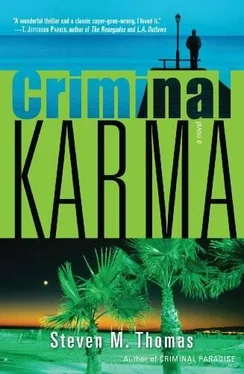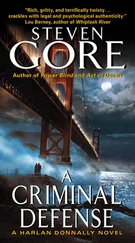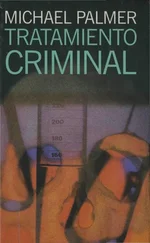“Please,” she begged. “I know what I’m doing. I don’t want to be alone tonight.”
In her pleading face I saw early signs of the decay that would overtake her if she kept drinking. Another year or two on the polish would transform her from a svelte middle-aged siren to a flabby old woman. And it was Baba who was driving her to drink.
“I’ll stay until you go to sleep.”
“Will you lie down with me and hold me?”
“Yes. I’ll wait in the hall while you get ready for bed.”
“Don’t bother. I can sleep in what I have on. I’m too tired-too drunk-to change. I just need to use the restroom.”
She walked unsteadily into the adjoining bathroom and closed the door. After a few minutes I heard water running. A little while later the toilet flushed. She came back out with her hair brushed and her lilac perfume reinforced. I peeled the bedspread and top sheet back so that she could lie down, then sat on the edge of the bed to take off my shoes.
“Thank you for being so nice,” she said, placing her hand flat against my back, with her fingers spread.
That stung.
I lay down beside her, still dressed in gray slacks and white dress shirt, and put my arms around her. She laid her head on my chest and snuggled against me. I was glad she had given the necklace to the guru, because I didn’t think I could have stolen it from her after hearing her story.
When she started to snore softly, I slipped out of bed and put my shoes and jacket on and searched her desk. The seashell jewelry box was in the top-right drawer, along with her wallet and checkbook. Her bank, where the necklace would be dropped off on Tuesday morning, was the B of A on Wilshire in Santa Monica.
In the jumble of papers on top of the desk, I found one of her lawyer’s cards paper-clipped to a note she had written him about the lease on her Bel Air property. Her handwriting was as elegant as her hands, expressing a private-school education in the 1950s.
I wrote the address of the Bel Air mansion on the back of the embossed card, stuck it in my pocket, and headed for the exit, passing through bare room after bare room, leaving Evelyn all alone in her empty house.
Outside, the brisk sea air revived me. Walking back to the flop through quiet streets, I tried to bring Baba and the situation into clearer focus. I had found out a lot about him, but he was still surrounded by a dangerous mystery. I now knew how he had convinced Evelyn to give him the necklace and when and where he was supposed to take possession of it. That seemed to give me the upper hand. But the wild card of psychic powers was still in the deck.
Anyone who doesn’t believe in some type of ESP isn’t paying attention. Even if they are unaware of it, everyone has had premonitions, not necessarily clear or of cosmic significance, but to some degree accurate. I’d had many such glimpses. The ability to see around existential corners was as much a part of my stock-in-trade as a cheerful smile and a loaded gun. Sometimes that meant carefully thinking through the likely stages of a scenario, action and reaction seen several steps ahead, as in chess or politics. Other times, though, it was a flash of insight, a visual or emotional sense that there was danger behind a locked door or something well worth risking danger for in a darkened building.
And I knew from my study of yoga years before that spiritual masters often have a second sight far more penetrating than my blurry guesses, the ability to perceive both past and future and to divine people’s inner thoughts and intentions. That’s what worried me about Baba.
The con job he was running on Evelyn made his spiritual stature doubtful. No true guru would exploit a mother’s grief for personal gain. But it was possible he had developed siddhis through sincere spiritual striving and then succumbed to the temptations that came with them.
According to the ancient texts, exceptional spiritual development instills tremendous charisma. Baba’s stroll along the boardwalk the previous evening showed how people flock to the spiritually electric, ready to surrender themselves body, mind, and soul. Gaining complete power over people sometimes revives a guru’s lower self, presenting one of the last and most insidious challenges on the path to enlightenment. Those destined to merge with God resist the temptation and use their powers selflessly for the good of humanity. Others succumb and begin to gratify the ego’s hunger, exploiting disciples for sex or money or influence behind a cloak of rationalizations.
Baba was hard to figure. The only thing I knew for sure as I felt the loose boards of the flophouse steps beneath my feet was that a battle with him was coming. We were both reaching for the same prize piece of merchandise, and one of us was going to get his fingers broken.
Up early on Monday, I met Chavi in the hall as I headed downstairs. She was on her barefoot way back to Reggie’s room after using the bathroom. Her face was glowing and I knew that Reggie wouldn’t have to worry about doing his own laundry for the next week or so and that he would probably be coming in for a new shirt or pair of pants.
Chavi smiled when she saw me.
“Who is the lucky lady?” she said.
“What do you mean?”
She held my chin and turned my head, her eyes roving over my face.
“You look like someone who is falling in love.”
“You’re good,” I said. “What do you and Reggie have planned today?”
“I’ll be at my booth,” Chavi said. “We both know what Reggie will be doing.” She shrugged, smiled good luck with the girl, goodbye, and see you later, then went on down the hall.
The Santa Anas had blown again during the night, whisking away the smut of expended sighs and sad memories, leaving the seaside world sparkling. It was still windy, palm trees thrashing. The front door of the abandoned house next door had blown open. I stepped into the littered living room and called Ozone Pacific’s name. I wanted to ask him something. When he didn’t answer, I went down the hall to the room where he camped out, following an orange extension cord that Budge had run over from the flophouse and spliced to an old mechanic’s drop light that he hung from the ceiling. The light operated with a pull string and held a forty-watt bulb, bright enough for Oz to see what he was doing after dark.
His sleeping bag was empty. Already out panhandling. The lining of the child-size bag was decorated with cactuses, bucking broncos, and cowboys with whirling lariats. His conglomeration of homeless-person junk-magazines, a few old books, some canned goods, and a gallon container of water-was piled in a corner. Looking at his living quarters, I wondered again how he had ended up this way. He had been an infant once, held in someone’s loving arms. There had been people who cherished him and dreamed of a different future for him than the one he had found. Or maybe not. Maybe he had been born unlucky to someone who didn’t want a child or who lacked the emotional or financial resources to raise one.
A short walk down Pacific Avenue, lively with people plunging into the workweek after the fantasy of the weekend, took me to the lot where the Seville had been parked since our return from Indian Wells.
Mr. Parker had a young black guy in a double-breasted beige suit cornered by his shack.
“Parking lot ‘tendant,” he said to the young man, scanning his face for any sign of amusement. “Mr. Parker. Get it?”
“Oh, yeah, that’s funny,” said the guy, who looked like the manager of a men’s boutique or a small hotel. “I’ll see you this evening, then.”
“Some people got no sense of humor,” Mr. Parker said as I walked up.
“Nice car, though,” I said, nodding at the gleaming black Maxima pulled up in front of the shack.
Читать дальше












